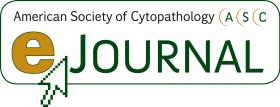
Atypical Glandular Cells in Pap Tests: Cytology-Histology Correlation and Risk Assessment with Human Papillomavirus (HPV) Testing
The eJournal is an online pathology journal club that reviews current articles from a peer-reviewed cytopathology Journal.
Participants will be able to review the journal article, commentary and webinar from the contributing author. This is a great self-assessment, teaching and continuing education tool.
Target Audience
This educational activity is designed for pathologists, cytopathologists, cytotechnologists, students and other members of the cytopathology community.
Learning Objectives
- Discuss atypical glandular cells (AGC) as a diagnosis and the challenges it poses on Pap testing
- Highlight the role of hrHPV testing and genotyping and discuss the utility it may play in stratifying patients with AGC on Pap testing
- Explore AGC Pap cytology findings with subsequent biopsy correlates to examine the risk of high-grade lesions
Presenter(s):
Lakshmi Harinath, MD
Kyle Damen, DO
Lianna Goetz, MD
Yimin Ge, MD
DISCLOSURE OF RELEVANT FINANCIAL RELATIONSHIPS
The faculty, committee members, Executive Board and staff who are in position to control the content of this activity are required to disclose to the ASC and to learners any financial relationships that have occurred within the last 24 months with ineligible companies whose primary business is producing, marketing, selling, re-selling, or distributing healthcare products used by or on patients. The ASC has reviewed the disclosures and mitigated all relevant financial relationships.
The following individuals have reported financial relationships:
Christopher J. VandenBussche MD PhD: Scientific Advisor Board (stock options) - AlxMed, Inc.
The following individuals have reported no relevant financial relationships:
Susan Alperstein, MS, CT(ASCP), Kristen Atkins, MD, Catherine Bammert, PhD, CT, MB(ASCP), Christine Booth, MD, Deborah Chute, MD, Amy Clayton, MD, Jacqueline Cuda, BS, SCT(ASCP), Fang Fan, MD, PhD, Beverly Haigler-Daly, BS, CT(ASCP), Michael Henry, MD, Oscar Lin, MD, PhD, Sean McNair, MPH, CT(ASCP), Michelle Reid, MD, Sinchita Roy-Chowdhuri, MD, PhD, Momin Siddiqui, MD, FIAC, Liron Pantanowitz, MD, PhD, MHA, Michelle Reid, MD, Sinchita Roy-Chowdhuri, MD, PhD, Momin Siddiqui, MD, FIAC, Michael Thrall, MD, Vivian Weiss, MD, PhD, Niyati Desai, MD, Sara Fasking, CT(ASCP), Andrew H. Fischer, MD, Brannan Brooks Griffin, MD, Lakshmi Harinath, MD, Jonas J. Heymann, MD, Melissa Hogan, MD, Xin Jing, MD, Seema Khutti, MBBS, Qing Kay Li, MD, PhD, Seyedreza Mousavi, MD, MS, CT(ASCP), Swikrity Upadhyay Baskota, MD, Saloni Walia, MD, Gizem Yilmaz, MD
The ASC staff associated with the development of content for this activity reported no relevant financial relationships.
Presenters: The presenters have no conflicts of interest or financial relationships to disclose.
ACCREDITATION AND DESIGNATION STATEMENTS
Continuing Medical Education (CME) Statement
The American Society of Cytopathology is accredited by the Accreditation Council for Continuing Medical Education to provide continuing medical education for physicians. The American Society of Cytopathology designates this enduring educational activity for a maximum of 1.0 AMA PRA Category 1 Credits™. Physicians should only claim credit commensurate with the extent of their participation in the activity.
American Board of Pathology Continuing Certification (CC)
This product can help fulfill the CME requirements mandated by the American Board of Pathology Continuing Certification (CC) process. Earn up to 1.0 SAM Credit Hours.
Continuing Medical Laboratory Education (CMLE)
The ASC designates this activity for a maximum of 1.0 Continuing Medical Laboratory Education (CMLE) credit hours for non-physicians. The CMLE credit hours meet the continuing education requirements for the ASCP Board of Registry Certification Maintenance Program. Participants should claim only the credit commensurate with the extent of their participation in the activity.
Cytotechnologists with Licenses in Florida and California
This program is approved for 1 continuing education credits in the State of Florida and 1 in the State of California. The credit on each link is good for three years from the presentation date.
Available Credit
- 1.00 AMA PRA Category 1 Credit™
- 1.00 California Credits
- 1.00 CMLE
- 1.00 Florida Credits
- 1.00 Participant

 Facebook
Facebook X
X LinkedIn
LinkedIn Forward
Forward